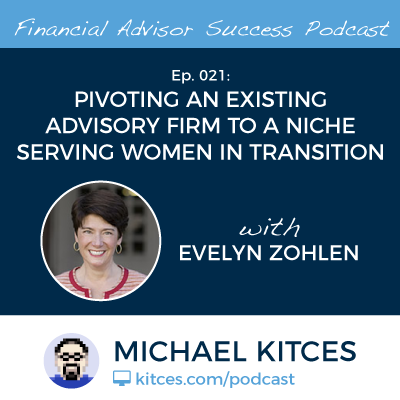 Welcome back to the twenty-first episode of the Financial Advisor Success podcast!
Welcome back to the twenty-first episode of the Financial Advisor Success podcast!
My guest on today’s podcast is Evelyn Zohlen. Evelyn is the founder of Inspired Financial, an independent RIA in southern California that provides holistic financial planning and asset management services for 110 families, and manages nearly $140M in assets under management.
What’s fascinating about Evelyn’s firm is that her business is focused entirely on a niche – working with “women in transition”, most commonly recent divorcees or widows. And by focusing in on a niche, she’s been successful in working with affluent women, charging an assets under management fee with a minimum retainer of at least $10,000 per year, and driving almost $1.2M of gross revenue with a team of 4 advisors – including herself – and 2 support staff.
In this episode, Evelyn shares not only the details of her niche advisory practice, but how she selected this niche in particular from the never-ending list of possibilities, and how she communicated to her existing clientele the transition to her niche – given that she didn’t adopt a niche focus until after she had run her advisory firm for 5 years, and had already acquired another practice! Evelyn also shares some of the training she sought out to improve both her technical and relational capabilities in her niche, and how she leverages her niche to drive 85% of her new business development as inbound referrals from centers of influence.
And be certain to listen to the end, where Evelyn also shares the multi-advisor staff structure of her firm, how she allocates clients amongst herself and the other advisors within the firm, and the weekly meeting process that she uses to keep her team on track and well coordinated while serving all the firm’s clientele as an ensemble practice.
So whether you’ve been wondering what it’s like to pivot an existing advisory firm into a niche, what it takes to pick a particular niche and really go after it, or simply how to run an effective multi-advisor team and coordinate amongst multiple team members who all interact with the clients, I hope you enjoy this latest episode of the Financial Advisor Success podcast!

 Welcome back to the twentieth episode of the Financial Advisor Success podcast!
Welcome back to the twentieth episode of the Financial Advisor Success podcast!
